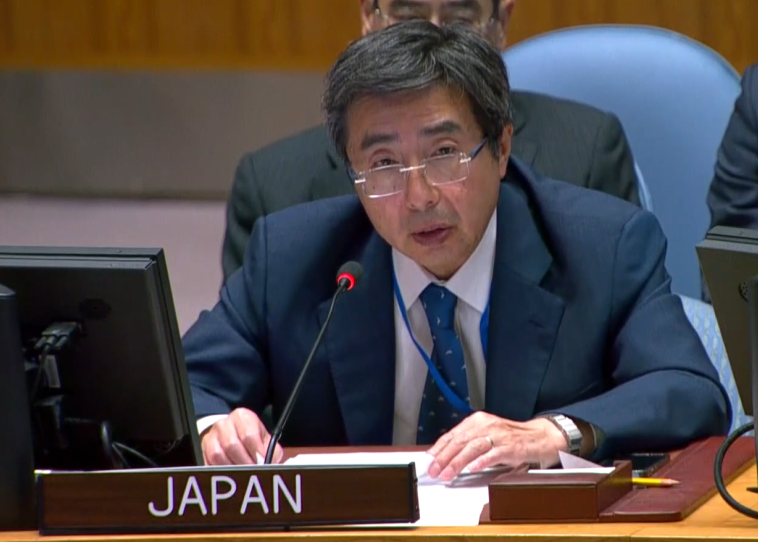シリア政治及び人道情勢に関する安保理会合における石兼大使ステートメント
令和5年7月24日

(As delivered)
Madam President,
I thank Special Envoy Pedersen and Mr. Ramesh Rajasingham, OCHA Director of Coordination for their briefings.
It has been nearly two weeks since Russia vetoed the resolution that would have extended the cross-border mechanism for aid delivery. When needs in Syria are at an all-time high, such an outrageous act politicizes humanitarian assistance and is a painful betrayal of the Syrian people including women and children, for whom the continued provision of aid is a matter of life or death.
Japan continues to believe that cross-border assistance provided under a Security Council resolution is the best way to ensure the necessary predictability, transparency, and accountability required by donors and humanitarian actors, including the UN and NGOs. All this, in turn, facilitate the early recovery assistance so much needed by the people of Syria.
Indeed, Council members continue to exert all efforts to adopt a new resolution extending the mechanism under the coordination of the co-penholders, Switzerland and Brazil, but so far there is no breakthrough. UN operations there remain suspended, and cross-line assistance has not yielded sufficient results. As we stand idle, situation on the ground worsens day by day.
Under such circumstances, the delivery of assistance to the Syrian people, who are surviving daily hardships, must be the priority. This is the reason why Japan extends its assistance not only through cross-border mechanism but also for all parts of Syria. We, therefore, fully support USG Griffiths' efforts to explore options with the Syrian Government on specific modalities for the timely resumption of assistance via Bab al-Hawa, pending a new resolution of the Security Council. We strongly encourage such efforts so that aid can be delivered “without constraints” at the same scale and speed as before.
The recent decision by the Syrian Government to allow UN cross-border aid via Bab al-Hawa includes impractical “restrictions” for humanitarian actors. We would like to request maximum flexibility from the Syrian Government in dealing with this purely humanitarian issue. If an agreement on these modalities is reached between both parties, and a certain level of transparency is ensured, including through a monitoring mechanism, this would be an important step for donor countries to continue their assistance to Syria. In this regard, we wish to continuously receive the bi-monthly Secretary-General report. Furthermore, the UN’s funding scheme for NGOs needs to be continued, pending a new resolution of the Security Council.
Lastly, we must also consider the country’s long-term future. While we are aware of Arab regional efforts to advance the political process based on resolution 2254, the political track remains frozen including the Constitutional Committee. Without a fundamental political solution to the Syrian crisis, the impoverishment of nearly 90% of Syrians living below the poverty line will continue to deepen, and the issues of refugees, the internally displaced, and missing persons will remain difficult to resolve.
I thank you, Madam President.
I thank Special Envoy Pedersen and Mr. Ramesh Rajasingham, OCHA Director of Coordination for their briefings.
It has been nearly two weeks since Russia vetoed the resolution that would have extended the cross-border mechanism for aid delivery. When needs in Syria are at an all-time high, such an outrageous act politicizes humanitarian assistance and is a painful betrayal of the Syrian people including women and children, for whom the continued provision of aid is a matter of life or death.
Japan continues to believe that cross-border assistance provided under a Security Council resolution is the best way to ensure the necessary predictability, transparency, and accountability required by donors and humanitarian actors, including the UN and NGOs. All this, in turn, facilitate the early recovery assistance so much needed by the people of Syria.
Indeed, Council members continue to exert all efforts to adopt a new resolution extending the mechanism under the coordination of the co-penholders, Switzerland and Brazil, but so far there is no breakthrough. UN operations there remain suspended, and cross-line assistance has not yielded sufficient results. As we stand idle, situation on the ground worsens day by day.
Under such circumstances, the delivery of assistance to the Syrian people, who are surviving daily hardships, must be the priority. This is the reason why Japan extends its assistance not only through cross-border mechanism but also for all parts of Syria. We, therefore, fully support USG Griffiths' efforts to explore options with the Syrian Government on specific modalities for the timely resumption of assistance via Bab al-Hawa, pending a new resolution of the Security Council. We strongly encourage such efforts so that aid can be delivered “without constraints” at the same scale and speed as before.
The recent decision by the Syrian Government to allow UN cross-border aid via Bab al-Hawa includes impractical “restrictions” for humanitarian actors. We would like to request maximum flexibility from the Syrian Government in dealing with this purely humanitarian issue. If an agreement on these modalities is reached between both parties, and a certain level of transparency is ensured, including through a monitoring mechanism, this would be an important step for donor countries to continue their assistance to Syria. In this regard, we wish to continuously receive the bi-monthly Secretary-General report. Furthermore, the UN’s funding scheme for NGOs needs to be continued, pending a new resolution of the Security Council.
Lastly, we must also consider the country’s long-term future. While we are aware of Arab regional efforts to advance the political process based on resolution 2254, the political track remains frozen including the Constitutional Committee. Without a fundamental political solution to the Syrian crisis, the impoverishment of nearly 90% of Syrians living below the poverty line will continue to deepen, and the issues of refugees, the internally displaced, and missing persons will remain difficult to resolve.
I thank you, Madam President.
